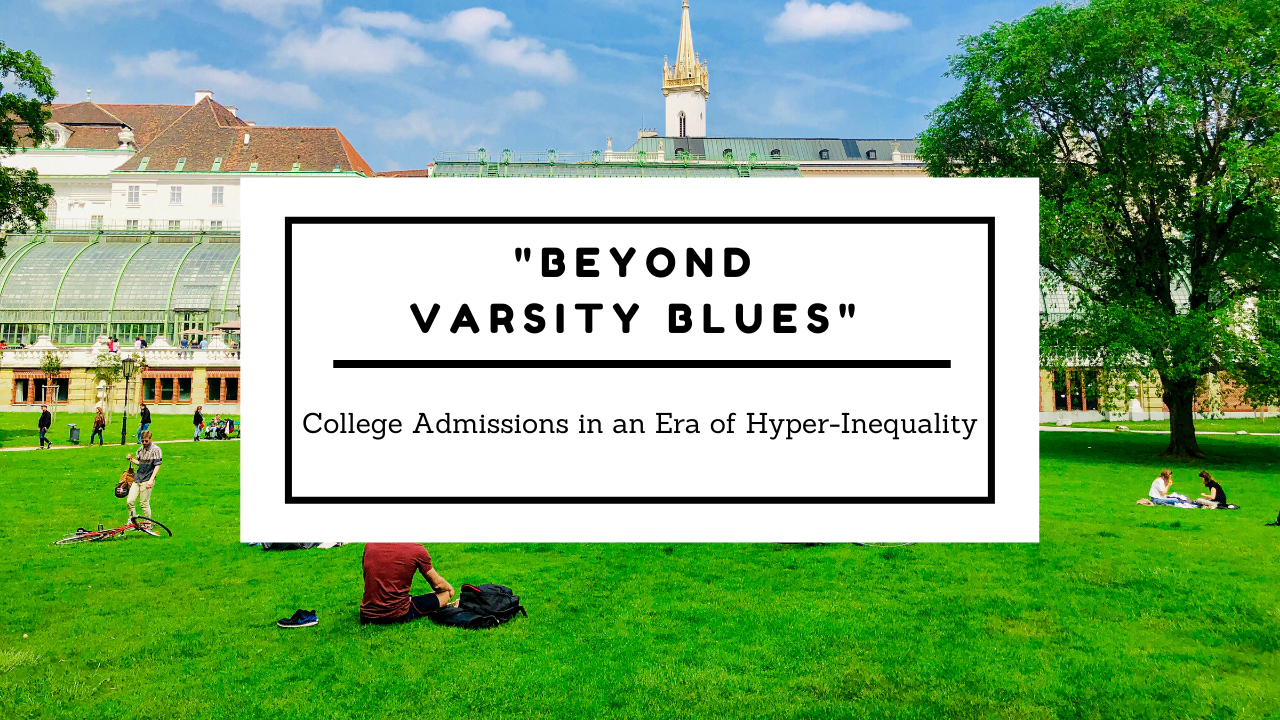 The families implicated in the ‘Varsity Blues’ scandal were willing to pay large sums of money (and, not to mention, their integrity) to secure admission to highly-ranked colleges for their children. Many of those whom the FBI caught now face prison time. That these families decided elite higher education may be worthy of such extreme measures should give us pause. What exactly is so valuable about admission to a selective college? And what specifically is the purpose of elite universities?
The families implicated in the ‘Varsity Blues’ scandal were willing to pay large sums of money (and, not to mention, their integrity) to secure admission to highly-ranked colleges for their children. Many of those whom the FBI caught now face prison time. That these families decided elite higher education may be worthy of such extreme measures should give us pause. What exactly is so valuable about admission to a selective college? And what specifically is the purpose of elite universities?
For some families, elite universities matter because they offer abundant academic, extracurricular, and financial resources; a robust professional and social network; and the promise of upward mobility, especially for less privileged students. The texts below, however, indicate that elite universities have largely prioritized maintaining prestige over elevating their students, particularly less privileged ones. The first two texts below highlight the ways that elite universities have failed to support their first-generation and low-income students. The third questions whether elite universities actually contribute to their students’ successes or simply select for students who are likely to succeed anyway.
- Jack, Anthony Abraham. The Privileged Poor: How Elite Colleges Are Failing Disadvantaged Students. Harvard University Press, 2019. Though elite universities have created increasingly diverse student bodies over the last few decades, they continue to draw students from privileged backgrounds. Jack argues that college policies and culture fail to distinguish between these “privileged poor”— low-income students from elite, private high schools—and the “doubly disadvantaged.” As a result, Jack reveals the challenges that the doubly disadvantaged face on campus, which threaten their chances of success.
- “These colleges are better than Harvard at making poor kids rich,” Dylan Matthews. While students from underprivileged backgrounds receive substantial benefits from attending elite universities, Matthews draws on research from the Equality of Opportunity project to argue that it’s really colleges beyond the Ivy League that foster the American dream more, in large part because elite universities accept very few low-income students.
- “How Much Does Getting Into an Elite College Actually Matter?,” Kevin Cary. After controlling for SAT scores, economic backgrounds, and college ambitions, researchers found that students “poised to succeed” do well, independent of their acceptance into an Ivy League university. However, they find an exception in the data: students from less privileged backgrounds receive huge boosts from selective colleges.
The following articles suggest ways that colleges can re-orient themselves toward the goal of providing high-quality education and resources to more students and minority students in particular, specifically by reforming admissions practices.
- "One Way to Stop College-Admissions Insanity: Admit More Students," Adam Harris. Harris argues that elite schools should admit more applicants in order to reduce the prestige of an elite college diploma. Doing so, he believes, would reduce the mania around college admissions that fosters corruption in the system.
- “Why Stanford Should Clone Itself,” David Kirp. Kirp argues that if elite universities truly wish to diversify their student populations and limit the role that wealth plays in admissions, they should open satellite campuses in new cities. Rather than acting like luxury brands that purposely limit their accessibility, elite schools should aim to educate more students. “If Yale can open a campus in Singapore,” Kirp wonders, “why can’t it start one in Houston?”
- ”I’m for Affirmative Action. Can You Change My Mind?,” Gary Gutting. Gutting argues in favor of affirmative action by claiming that it is “sufficiently worthy” to prefer minority applicants over majority ones. He writes that minorities are severely underrepresented at the top 100 universities because racial inequalities leave minority students with fewer resources and opportunities to achieve the admissions criteria. Gutting claims that universities are morally obliged to “compensate for the damage done to minorities” by the United States’ dismal record of racial marginalization.
-
The Single Biggest Fix for Inequality at Elite Colleges, David Denning. Examining controversies surrounding legacy admissions, Denning argues that rather than eliminating legacy admissions, universities should consider how current admissions practices privilege wealthy students across the board, not just the children of wealthy alumni. He suggests that the U.S. Department of Education should require colleges to share data about the income level of their admitted students as a way to create pressure for elite universities to admit more economically diverse cohorts.
Questions for discussion:
-
Does attending an elite college matter to you? Why or why not?
-
For you, what should be the purpose of higher education? Do you think universities’ visions for the purpose of higher education align with yours?
-
Do you think universities’ admissions practices are consistent with your ideas about the purpose of higher education?
-
What can universities do to improve their admissions practices to make them more consistent with the aims of higher education?
-
For example, should elite colleges accept more low-income students, as Denning suggests?
-
Does Harris’s solution to admit more students align with the aims of elite higher education? What about Gutting’s argument for affirmative action? Or Kirp’s solution to have elite schools open satellite campuses?
-
Regarding Harris’s argument in The Atlantic article, what factors stop colleges from accepting more students?
-
How can elite colleges better support the “doubly disadvantaged” students that Anthony Jack described in The Privileged Poor?

